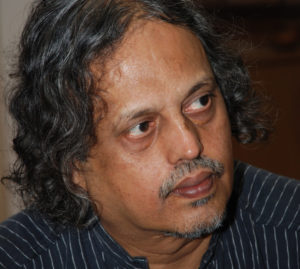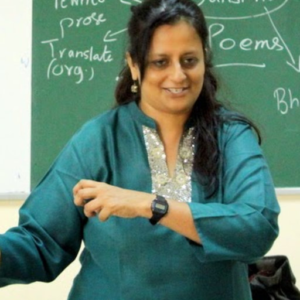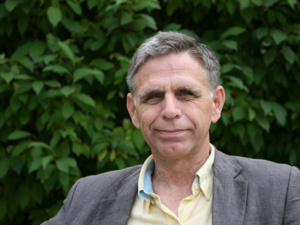University of King’s College professor Dr. Gordon McOuat is making the most of online learning by co-teaching an online course with Dr. Sundar Sarukkai and his students in India.
“This year I decided, since we’re all going online … that it would be the perfect opportunity to try something new,” said Dr. McOuat.
Dr. Sarukkai first visited King’s in 2017 to present the university’s inaugural MacLennan Lecture on the topic of “Science and the Rationality of the Social.” Dr. Sarukkai, who was then teaching at the National Institute of Advanced Studies in Bangalore, India, and Dr. McOuat kept in touch after Dr. Sarukkai’s visit to King’s, mulling over the idea of doing a collaborative class where they would teach the same syllabus across the world from each other. The move to online learning made this year the perfect time for “seizing the opportunity,” says Dr. McOuat.
Science and Culture II: Resetting the Modern has been running since the start of the winter semester. At King’s it is a Contemporary Studies Program (CSP) course that is cross listed with the History of Science and Technology (HOST) program. The participating students from India study at three different universities: The National Institute of Advanced Studies in Bengaluru, The Institute of Science Education and Research in Bhopal, and Manipal University in Jaipur.

Dr. Sundar Sarukkai, who first came to King’s as a visiting scholar in 2017, is co-teaching an online course with Dr. Gordon McOuat.
Though drawn from different institutions, Dr. Sarukkai’s students are all part of the Barefoot Philosophers, an initiative he founded in response to the decreasing role of philosophy in university spaces in India. Students from across India participate, discussing philosophy and exploring the world around them. Pre-COVID, the Barefoot Philosophers hosted events and summer camps to teach children about philosophy. Their website also includes various articles by philosophers that people can read for free online. Not only do the students participating in this course have the opportunity to work with Dr. McOuat and Dr. Sarukkai, they are also working with Dr. Meera Baindur, whose research focuses on feminism and ecological philosophy and who is a part of the Barefoot Philosophers team.
Comprising six modules, the course is taught asynchronously—meaning lectures are recorded and made available for students to watch at their own pace. Each module includes different readings for the student to complete, with three “think pieces” due throughout the term that ask students to write about a specific reading, and a final project for students to complete. Once a month a live discussion takes place, in which the students from Canada and India log on to discuss the modules together. The tutorial discussions take place at 9:30 a.m. AT to account for the nine and a half hour time difference between Halifax and India.
Topics of the tutorials include posthumanism, the technological sublime, decolonization, and resetting modernity.

Dr. Meera Baindur is also assisting with the course.
Dr. McOuat hopes that this helps to broaden the perspective of King’s students while acknowledging that the university still has a long way to go on diversity and Euro-centrist learning. He says that the students are excited to gain a more worldly perspective, even virtually, and he hopes that this exposure will encourage students to seek other perspectives in their future learning.
Student Adrianna Vanos described a recent experience in the course that changed her perspective on the material being studied, and on how learning takes place:
“In our most recent collaborative tutorial, we were discussing epistemic diversity and the question ‘how can we value different standpoints and not be violent in the creation of knowledge claims?’ My first instinct was to discuss that week’s reading on Haraway and ‘Situated Knowledges’. However, a student from the Barefoot Philosophers group offered insight into the practice of Jainism in relation to the given question. Instead of recycling our understanding of the text and lecture into the tutorial, we were given the opportunity to learn something new and of significant value. The perspective on Jainism altered the way I thought about the question of epistemic diversity and embodied knowledge, which ultimately deepened my engagement with the text.

King’s professor Dr. Gordon McOuat hopes this new experience might alleviate the fatigue of extended ‘screen time.’
“This interaction forced me to re-evaluate the way I approach learning. We are too often in echo-chambers with our peers who have read the same material and learned from the same professors. While I cannot speak on behalf of the students from India, I think that this experience has and will continue to allow all of us the opportunity to be exposed to new and important perspectives. This collaboration has been the most rewarding part of my online school experience and I hope that similar engagements continue to happen at King’s and beyond.”
In a time when so much of our lives has become virtual, Dr. McOuat is also hopeful that learning in a different format will help to alleviate students’ fatigue with online education.
Nelly Bateman, a student in the class, said the experience “deepens my learning.”
“Learning with our colleagues in India has added a silver lining by giving us this new opportunity that really couldn’t have happened if we weren’t all online,” she said.
So what does this collaboration look like in practice?
Dr. Sarukkai’s first assignment for students in the class was simple: look at the moon for a week. Once students did that, they were instructed to think of the different ways the moon is looked at, examples being through NASA, poets, Galileo, and Hindu philosophy. Students were then tasked with bringing something original to say to the first international online discussion.
Perhaps looking at the moon with people from the other side of the world is what students need to reinvigorate them in a year that has required long hours of ‘screen time.’ Dr. McOuat is confident that these students are up to the challenge of something new, saying they’re the “best students in the planet.”
Header photo by Bryan Jones

